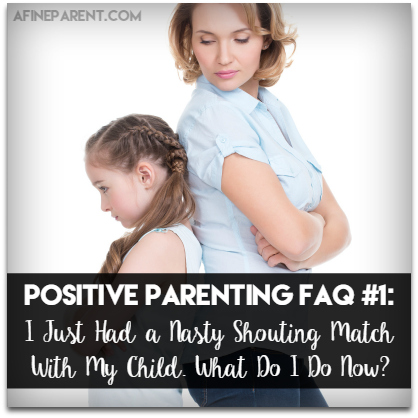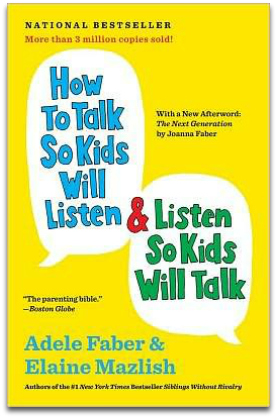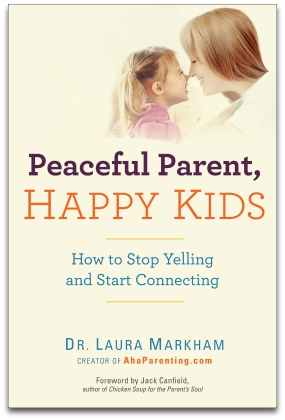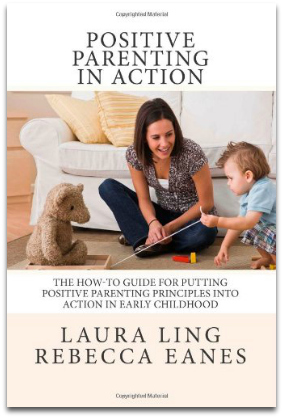 In my house, 90% of all arguments start with a “Can I?” followed up with a “No.”
In my house, 90% of all arguments start with a “Can I?” followed up with a “No.”
Then CRACK! We’re off to the shouting matches.
Here’s a recent shout-a-thon.
“Can I have a PS5?”
“No.”
“But why can’t I have a PS5?? Alex has one! And so does Miles!”
“But you are not going to have one. You don’t need one!”
“But they have Star Front Battle Wars! I love that game!”
“I said NO!”
“But I WANT it! And I am GOING to get it!”
“You. Are. Not! Now, you listen to me, young man! There is no way, on this green earth, that I am going to buy you a PS5!!”
“YOU CAN’T TELL ME WHAT TO DO!!!”
“GAAAAHHHHH!!!!”
Did all that shouting solve anything? Nope. Am I proud of myself? Not in the slightest. In fact, as soon as I calm down, I feel awful. I shouted at my child! I’m not even sure why. I must be the worst parent ever!
Sound familiar?
I’ll let you in on a little secret …
Everyone loses their temper at their kids once in a while. That doesn’t mean we are bad parents. We are human, after all. Disagreements are a part of any relationship.
 And the occasional shouting match isn’t going to scar your baby for life. Unless it becomes a personal attack where we start belittling or blaming our child, says Adele Faber, a parenting trainer and author of How to Talk So Kids Will Listen & Listen So Kids Will Talk.
And the occasional shouting match isn’t going to scar your baby for life. Unless it becomes a personal attack where we start belittling or blaming our child, says Adele Faber, a parenting trainer and author of How to Talk So Kids Will Listen & Listen So Kids Will Talk.
But that doesn’t mean shouting should become our default conflict resolution tool either. When we routinely have yelling matches with our children, we teach them that shouting is the way to handle conflict.
In my role as an organization development consultant, I help individuals navigate through their conflicts with others. One question I ask is “Would you shout at a stranger if they made a reasonable request you don’t happen to agree with it?” Without fail, the response is almost always, “No.”
So, if we wouldn’t shout at a stranger, why is it okay to behave this way towards those whom we love the most?
Not only do we owe our kids the same courtesy we offer random strangers, but research also shows that shouting at our children can make behavioral problems worse!
The more I shout the more my boys act out which leads to more shouting and more behavioral issues. Studies have also shown that regular shouting matches can lead to more fights with friends, lying, and signs of depression.
All that is fine, but once you fall off the wagon, how can you put the fight behind you and get back on the Positive Parenting track?
Here are the 6 steps I use as a parent and a consultant that can help you and your child move beyond all the shouting.
#1 Call a Time Out
 Not for your kids. For yourself!
Not for your kids. For yourself!
Yelling is an emotional reaction.
As Dr. Laura Markham says in Peaceful Parent, Happy Kids: How to Stop Yelling and Start Connecting:
As long as you’re human, you’ll still sometimes find yourself in fight-or-flight mode, and your child will start to look like the enemy. When you’re swept with anger, you’re physically ready to fight. Hormones and neurotransmitters are flooding your body.
So, the moment you realize you are yelling, stop and walk away. Take a break. Wait until you are calmer to talk through things.
I excuse myself from the argument by saying something like, “Oh wow! I’m yelling! I didn’t mean to get so emotional about this. I need to cool off before we can really sort this out.”
Resist the urge to continue until you’ve made your point. It’s hard I know. But, having that last word doesn’t make you the “winner”. Besides, in this state of mind, they aren’t going to hear your indisputable wisdom no matter how loud you shout.
#2 Apologize
A heartfelt apology can go a long way to mending fences. Say you’re sorry. “I’m sorry I started yelling. Sometimes I get so frustrated that we can’t agree, and I lose my head. I’m sorry. I’ll try to do better.”
By apologizing, I am modeling how I take ownership of my behavior and I am increasing the emotional intelligence quotient of my boys. Also, when we model taking responsibility for our behavior our kids are more likely to do the same.
#3 Tell Them You Love Them
 As they mature, kids go through a lot of boundary stretching. Pushing those boundaries to the limit inevitably brings arguments. Those arguments are filled with words and emotions that can provoke doubts about their relationship with you.
As they mature, kids go through a lot of boundary stretching. Pushing those boundaries to the limit inevitably brings arguments. Those arguments are filled with words and emotions that can provoke doubts about their relationship with you.
One way we can eliminate those doubts is by consistently treating our children with unconditional positive regard. Carl Rogers, a founding father of client-centered psychology, believed that this was crucial to resolving differences, especially with those we are having a disagreement with.
We can do this with our kids by behaving and speaking with them in a way that shows we completely support and accept them no matter what they say or do. Being clear about your unconditional positive regard for your child nurtures their growth and increases their self-esteem. Simply saying out loud, “We may not agree at this moment, but I still love you” can convey this to our children.
You two have just had a big fight, fraught with complex emotions they can’t really understand. Heck! Sometimes I don’t understand the emotions either! They need to hear that we still love them. Saying “I love you,” says, “You will always be a part of the family, no matter what.”
#4 Get to the Root of the Issue
To really understand why all this shouting started in the first place and to stop it from happening again you need to get to the root of the issue. You can only get to the root if you listen to them, and they listen to you.
When Evan and I argued about getting a PS5, I thought we were arguing about how he could spend his free time. In Evan’s reality we were arguing about allowing him an experience that would give him another way to connect to his friends.
 I found this out because I used active listening.
I found this out because I used active listening.
Carl Rogers, who was also the pioneer of active listening, said, “People who have been listened to in this new and special way become more emotionally mature, more open to their experiences, less defensive, more democratic, and less authoritarian.” I want kids like that!
Part of active listening is using I-statements to tell them how we feel (i.e. why I was shouting) while taking ownership of the emotions. When Evan and I were cooled down and ready to talk, I-statements got us back on track.
I-statements are sentences that begin with “I think…,” “I feel…,” or “I believe…,”.
In my case, after we were much calmer, and I had apologized and told him I loved him I said, “I feel frustrated when I see someone so creative do something I believe wastes their time and energy.”
By saying “I feel…,” I am laying my feelings and my reactions on me, not on Evan. Taking the responsibility and blame for my own reactions defuses tensions and lowers his resistance to hearing me. It is very important to be intentional about not allowing blame or labeling to taint the I-statement.
Then it’s time for me to really listen to what he has to say. And, boy! Was I surprised!
“Mom, all my friends talk about these games on the way to school and I don’t know anything about them. I get left out and that makes me feel lonely.”
Whoa! This new knowledge completely changes the whole conversation! Now that I know what the problem is, we can start to work on fixing it.
#5 Let Them Come Up With a Solution
Adele Faber recommends letting children figure out their own solutions. I agree.
A basic tenet of my field is that the solution to the problem is already inside the organization. Your child already has the answer right inside of her! You just need to help coax it out. There is also research that shows that if people help to create the solution, they will be more likely to stick to it.
In our case, my “No” on the buying of a PS5 was final. However, because I now knew the real issue was feeling disconnected from his friends we could think through other solutions.
After a calm discussion of all our options, he decided to invite his friends here and I would run a Dungeons and Dragons role-playing game for them, rather than buy more stuff just to blend in.
This isn’t a one-time wonder either. We’ve also used this approach to effectively end homework battles as well. Evan came up with the solution of writing out what he had to do and when he would do it each week. This let me feel confident that he isn’t forgetting anything or slacking off and he doesn’t have to listen to me doubt his abilities and intelligence on a daily basis.
We’ve been doing this for over a year now and it has been a total Win-Win!
#6 Do Something Together
The issue at hand is resolved, but we have one last thing to do: restore the frayed connection with our kids. It’s a simple thing to do, and yet, I’ve found that this is necessary to prevent repeat shout-a-thons.
After some real shouting match doozies, my boys need to do stuff with me. They need to be around me and feel our parent-child connection — even if we’re just running errands.
Whenever possible, we try to put together a puzzle. Or play a card game. Or go to a movie. Doing something with my boys after an argument gives us a chance to build a bridge over the argument and forge new channels of communication.
In an ideal world, we would have no shouting matches. Ever.
But this isn’t an ideal world, is it? With several individuals living under one roof, there is bound to be disagreements, some of which will inevitably deteriorate into shouting matches.
As someone who has committed to positive parenting, this can feel like a huge setback. Guilt is likely to follow close at heels.
But guilt does not solve things. If anything, it will only weigh down on our resolve to be positive parents.
Instead, take a deep breath. Accept what happened and move on to utilizing this opportunity for growth. For forming deeper connection. And as a way to fortify your positive parenting resolve and toolkit.
 As Laura Ling and Rebecca Eanes say in Positive Parenting in Action:
As Laura Ling and Rebecca Eanes say in Positive Parenting in Action:
Positive parenting is about believing in the altruism of our children, believing that they want to do what is good. It is about believing that behavior is a form of communication and clues us in to what is going on inside the child. Positive parenting is also about being firm and kind, consistent and empathetic, and viewing disagreements between parents and children as opportunities to develop problem-solving skills and learn how to navigate relationships.
Good luck!
The 2-Minute Action Plan for Fine Parents
Take two minutes to think about the following questions:
- How often do disagreements with your children end up as shouting matches?
- How long does it take you to realize a simple disagreement has become a full-blown shouting match?
- What steps are you taking to get past the argument and re-establish the peace? What is working for your family? Where could improvements be made?
- How often are you figuring out the real root of the argument?
The Ongoing Action Plan for Fine Parents
- Actively listen. The more you practice active listening, the more your kids will feel your unconditional positive regard for them and the easier it becomes to prevent future arguments before they even start.
- Root out the issues. Figure out what your arguments are really about. Sometimes we make assumptions and end up totally off base. Figuring out the real root cause can make resolving disagreements much more painless.
- Work together to find solutions. Your child is a brilliant and creative individual. Help him think through options and be open to what he has to suggest. What he comes up with himself will probably be what works best.


I am a young parent who is who highly benefiting from your posts, thank you so much for mentoring us, I grew up in a family where a parent finds it hard to apologize to a child, but I have learnt that, when we parents say sorry to our children, they also learn how to say sorry to others especially when they are on the wrong.
With my 3 year daughter we have always connected back by doing things together or playing, sometimes a singing competition, and that gives me an opportunity to say “baby I am sorry for shouting at you..” she then says “I love you Mummy”, That alone melts my heart, quickly I replay “I love to baby” We hug and booom we are back to normal.
So really, these things work.
My wonderful son has huge emotions and he will start mocking, insulting, being physically aggressive (yelling in my face or holding my arms) . when he calms down, he is always sorry and says he wants to fix things. We do the steps delineated above. However it will happen again very soon.
The problem is I get so hurt when he does these things, and then I begin to yell back. Of course, the guilt then ensues. He always tells me that he doesn’t mean what he says when he is angry , but his cruel remarks really hurt
Any ideas to help me… how not to get so hurt and to help me react better?
Thank you for giving your time and energy to share your expertise and your thoughts. 👍
If your son is an older child, it might be a good idea sit down and practice some active listening. Tell your son you love him and that you are here for him. Tell him, though, that the sort of aggressive behaviors resulting from his big emotions are not appropriate. Apologize for yelling back at him. Suggest he find other, healthier, outlets like journaling or going for a run. If he really feels like he can control his anger it might be time to ask his doctor for a recommendation to a specialist who can work with him on healthier ways to communicate and channel his anger. This is a skill he is going to need his entire life.
Woow! am happy that some of the things I have been doing after I have had a shouting match with my 3 year old are acknowledged here; like apologizing, re-assuring her of my undying love and listening. Although some times when am so mad, I get on and off especially with listening to her. But I guess I can do better. Am taking it for one of my action points this week—but of course I will not wait for when both of us are shouting!
And is there any ways I can prevent the shouting match from starting, because what has been posted is what I can do as a parent when we are already on that road!. I will be glad. Thank you positive parenting!
Isn’t it nice to receive some support for the things that you’ve already been doing, Nakiboneka? I know that we shouldn’t judge ourselves based on what others are doing or what others think of us, but it sure is nice to have some support and encouragement for the things we’ve been doing that we are feeling insecure or unsure about. I’m so glad to know that after a shouting match you still are able to apologize and ensure your daughter of your undying love for her. That’s so important and she’s lucky to have that in a parent.
Wow! You sound like you are doing great! Let me tell you what I’ve been doing to stop the shouting at my house. I took a pledge not to shout anymore. The only behavior I can truly change is my own, so I decided that for Lent I wasn’t going to shout anymore. Zero. This mean I have to really pay attention to my own emotional and physical cues and let my boys know I’m getting upset by telling them. I say something like, “Guys, I’m starting to get really frustrated and really need us all to calm down and talk to each other.” They’ve really responded to that. Then we practice our active listening, which makes us all feel better and feel listened to. As a result I’ve noticed that both the boys are shouting less when they get frustrated, too!
I am going to carry this whole experiment beyond Lent and try my best not to shout at all. You and I can try together.
Great article! I have yelling matches with my daughter and I do not want it to continue into her teen years. I have realized pretty fast when were are headed for yelling and I try to remain calm. And when I do yell I do apologize and let her know I love her. I need to apply more active listening to figure out the root of the problem and a resolution. I need to get better at that.
Perfecting our communication skills is a long, continuing journey. Everyone feels they could do better at some point and even with some people in particular. You are doing a great job. And once you start getting deeper and into where the roots of the issues lay your communication and relationship with your daughter will be even better! Hang in there! You can do it!
A great article needing some guidance at the moment our 4 year old has been challenging us lately we try different ways but sometimes all our emotions seem to get in the way. Even to the point that these behaviours are happening at her Montessori kindy & we have to go see the teachers for a meeting about her behaviour. Not wanting to come in from outside & other behaviours running away or under tables etc.
Hi Rachel:
As I read your statements about refusing to come in from outside, running away, hiding under tables, this makes me wonder about how well your 4-year-old handles sensory information (sensitivity to light and sound, physical presence of other people near her, etc.) When I hear that kids are hiding under tables, I’m always wondering if they are afraid of something. In my counseling practice, I’ve met plenty of kids with Sensory Processing Disorder who look like they are being defiant by refusing to listen to adult directions when in fact it is the sensory overload that is causing the child to not listen to directions because the child is working on how to handle these senses first, which trumps compliance with adults.
If you’ve noticed that your child is over-responsive to sensory information (sight, touch/textures, sound, taste, smells and even balance) then you may want to check out the Sensory Processing Disorder Foundation at http://www.spdfoundation.net/about-sensory-processing-disorder/. This will have some answers as to what to do for kids who are acting out because of this reason.
I agree with Emily that SPD might be in play. However, also try to watch how you are reacting to her behavior. Don’t try to modify anything yet until you have a good baseline on all the actions/reactions going on in your own household. Once you have figured out how your behaviors are affecting each other then you can try some deliberate modifications.
Ask her school to also watch for any behavioral triggers or patterns and see if any commonalities stand out.
Hang in there!
I also wanted to add that when my boys were 4 we also experienced a HUGE boundary pushing developmental phase. 4 year olds are making a developmental leap in understanding how they can affect their environment. It’s a similar phase to when they are 2yos. Loving, consistent, and firm boundaries will help them not only understand what is and is not acceptable behavior, it will also make them much more secure in their relationship with you.
Enjoyed this post! The guilt definitely does set in. I am grateful that some time ago I decided that I didn’t want to base my parenting on fear and pride. I’m a lot better now at going back to my child when I’ve had a second to regroup and apologizing. I don’t apologize for being upset or change my stance necessarily, but I do apologize for the way I handled things, for not taking the time to understand her side first, and for at times allowing outside issues to cause me to respond in a loving manner. It has helped our communication tremendously, as kids learn by example, and I find her coming to me after one of her emotional outbursts returning to apologize. She even will explain why she reacted in that way and it makes me feel proud that I have taught her well how to express herself and be humble enough to address it when she behaves in a hurtful manner. — improudtobenaturalme.com
That’s so wonderful, Marlene, that you’re willing to apologize when you feel like you’ve handled something wrong. It is truly a strength for a parent or other adult to be willing to apologize to a child. Some people really struggle with it and believe that it’s their “job” as an adult and parent to stick to their guns no matter what they’ve said, even if they’re really wrong.
It is so refreshing to hear/read other people advocating for apologizing to children. I’m enjoying how the parenting approach has shifted from Authoritarian “Because I said so!” to more positive, loving and encouraging (not to be confused with permissive parenting, of course!)
Thank you, Emily. I definitely grew up in the more authoritarian, “… because I said so,” household. I feel like in some ways we get an amazing opportunity to learn through how we were raised, and what we’ve experienced of others, to choose to follow the examples that worked well and try a new approach for those that didn’t pan out so well.
Wow! Fantastic! You are being such a great role model for her and it’s showing. Not apologizing for emotions is such a key thing for kids. They shouldn’t feel bad about what they are feeling, but they should recognize they are responsible for their own reactions to those emotions.
Thanks Malinda! I agree. We feel the way feel for whatever reasons we have in the moment. I definitely care more about her understanding that she is loved and that everybody makes mistakes. I want her to be comfortable expressing her emotions and understand the importance of seeking and receiving forgiveness. It seems she’s learning and that makes me feel proud.
How truly wonderful. 🙂